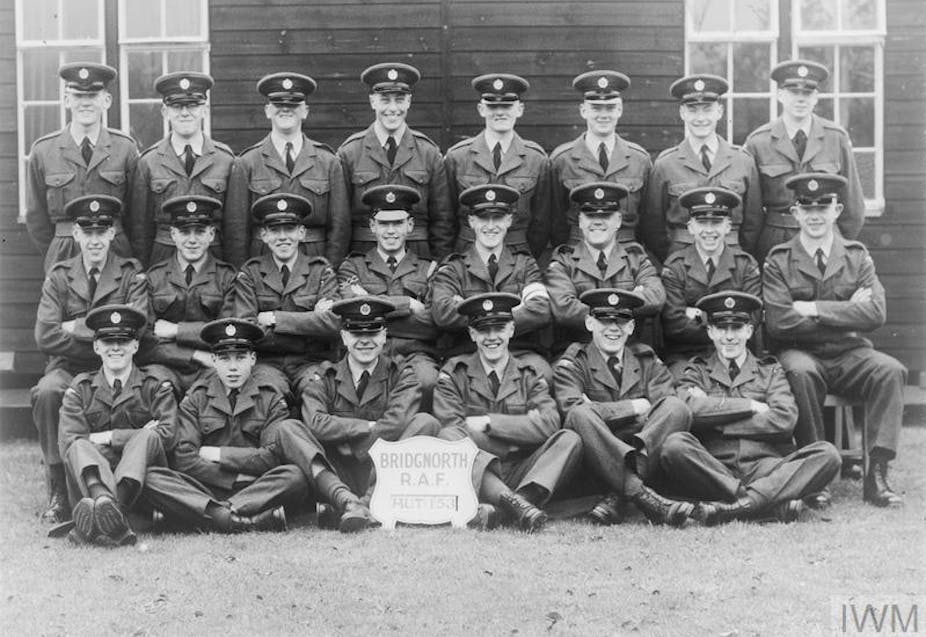Ukraine compelling all men aged 18-60 to stay in the country and fight the Russian invasion is a reminder of the reality of military conscription in many countries in Europe and around the world.
In recent decades, military service in Britain has been voluntary, with conscription regarded as a characteristic of less liberal, more militaristic nations. But this hasn’t always been the case – during the second world war and for a decade and a half after, around 2.3 million men completed two years of national service under the National Service Act.
Politicians, journalists and other public figures have periodically called for a return to national service. Some have cited anxieties about the supposed lack of discipline among the degenerate “youth of today”.
My research team has interviewed over 100 ex-national servicemen – mainly from working-class backgrounds across five different regions in Britain: the Glasgow area, north-east England, the West Midlands, south Wales and south-east England. We wanted to find out how conscription shaped their feelings about masculinity, class and British character. Our research shows that among those who experienced national service, there is not a strong sentiment to bring it back. Nonetheless, most viewed national service as a positive time in their life.
Interviewees frequently stated that national service “made a man” of them – usually meaning that it made them more independent and mature – and helped them in their later careers. They did not believe that national service made them more aggressive or eager to engage in military combat. They had seen and heard enough of war to know that it was not glamorous. Their fears only increased with the proliferation of nuclear weapons in the 1950s, a development that worried many interviewees and strengthened their belief in the futility of war. As one former recruit said:
I wonder what attitude I’d have if I had had to go to Korea. I’d be frightened to death, I think. I didn’t join the army to fight, you know what I mean!

Should it be brought back?
Some agreed that national service should be reintroduced as a way of instilling social discipline, but the majority doubted that this was feasible for various reasons. They considered young people more ethnically and religiously diverse in contemporary Britain, suggesting this would make them less likely to agree to such an imposition by the state. Most important, young people had not been subject to the same disciplines of family, school and community life as the national service generation.
A minority did think that a kind of compulsory community service remained a good idea. But not to teach people how to fight in the “national interest” – instead, to instil in them the importance of the common good. As one man said about his time in the RAF (Royal Air Force):
It taught me that … you’ve gotta keep together. We live in a community, you know. If you let yourself divide and rule, you know, and you’re picked off -– this is what the governments are very fond of doing -– dividing and ruling –- there’s always some bugger they’re picking off … you realise that we’re all part of a world together.
People imagine that reintroducing conscription would not only instil social discipline but also unquestioning loyalty to the nation above all else. This ex-serviceman’s words are a useful reminder that a sense of community responsibility and unthinking patriotism are different things.
Conscription in Britain
Throughout the 18th and 19th centuries, Britain waged successful wars of imperial expansion without resorting to formal methods of conscription, because informal methods worked well. There was often a ready stream of recruits wanting to escape poverty.
When extra soldiers and sailors were required, during the Napoleonic wars especially, men could be violently forced into military service and stolen from their communities by the “press gang”, who used physical force to recruit men against their will – this was known as “impressment”.

In the late Victorian period, the National Service League called for more formal schemes of conscription. Conscription was introduced by the state during the first world war but not until 1916, when numbers of volunteers failed to meet the insatiable demand required by industrialised warfare.
There was no political will to extend conscription into peacetime and it was phased out after “the war to end war” was over. Reintroduced in 1939 to meet the Nazi threat, conscription continued after the second world war. The National Service Act was passed in 1947, introducing peacetime conscription that compelled all young men aged 18-30 to undertake two years of military service.

Under the act, young men had to undertake six weeks of basic training – involving a quite brutal disciplinary shock – until being assigned generally mundane tasks. Stories about having to paint coal white and cutting grass with nail scissors were apocryphal, but contained more than a grain of truth.
Some men avoided service on medical grounds or because their other occupations (coal miners, merchant sailors) were considered vital. Others postponed their service until they finished apprenticeships or university degrees. Most of those who did serve stayed in Britain, though some saw active service abroad – 280 died in the Korean war.
After a long campaign in the Daily Mirror and years of criticism by Labour politicians such as Barbara Castle, conscription was eventually phased out in 1960, though it had been running down for some years. Most military leaders did not want conscripted men – they were never that keen – and most important, the public was no longer willing to accept the sacrifices demanded by national service.

